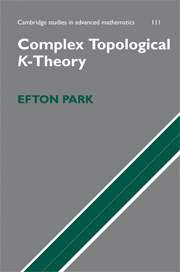4 - Characteristic classes
Published online by Cambridge University Press: 31 October 2009
Summary
In general, it is quite difficult to tell if two vector bundles are isomorphic. The theory of characteristic classes is designed to remedy this problem. The idea of characteristic classes is to assign to each isomorphism class of vector bundles (or more generally each K-theory class) an element in a cohomology theory in which it is easier to distinguish distinct objects.
While we could define characteristic classes quite generally, we will simplify matters greatly and only consider smooth vector bundles over smooth compact manifolds. Because not all readers may have had a class in differential topology, we begin this chapter with a crash course in the subject, paying particular attention to the cohomology theory we will use, de Rham cohomology.
De Rham cohomology
Let x1, x1, …, xn be the standard coordinate functions on ℝn and let U ⊆ ℝn be an open set. A real-valued function on U is smooth if it possesses partial derivatives of all orders. A complex-valued function is smooth if its real and imaginary parts are both smooth; the reader is warned that this is not the same as saying a function is holomorphic.
For each of the coordinates xk, associate an object dxk, and let Ω1(U) denote the set of formal sums
The elements of Ω1(U) are called (complex) differential one-forms, or usually just one-forms. One-forms are added in the obvious way, which makes Ω1(U) into a vector space.
- Type
- Chapter
- Information
- Complex Topological K-Theory , pp. 176 - 202Publisher: Cambridge University PressPrint publication year: 2008



